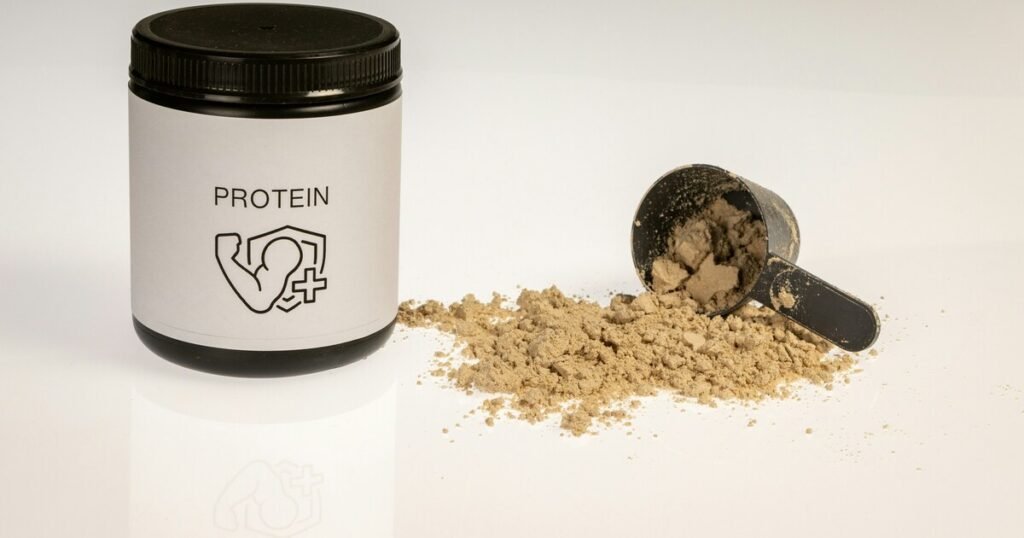We independently test and review fitness products using a research-based approach. If you buy through our links, we may earn a small commission at no extra cost to you. Read our Disclosure
Building muscle mass at any age is a rewarding pursuit, but hitting the big five-oh can bring its own set of challenges and rewards. As you step into this vibrant decade, fueling your body correctly becomes not just important, but essential for maximizing muscle gain and overall health.
Nutrition plays a pivotal role in muscle development, especially as our bodies change with age. The right nutrients can enhance muscle protein synthesis, promote recovery, and help counteract muscle loss that occurs naturally over time. But what does the ideal diet look like when you’re over 50 and aiming for those gains?
Let’s unravel the secrets to optimizing your dietary intake to build muscle effectively and safely. Whether you’re a seasoned gym-goer or just starting, these key nutrition tips will help you achieve the results you’re striving for, while also supporting your health and vitality.
Nutrition Basics for Muscle Building Over 50
To build muscle effectively, understanding your body’s evolving needs is crucial. As you age, the metabolic rate slows down, and muscle mass maintenance requires a higher protein intake. Lean proteins such as chicken, fish, and plant-based options like lentils should be staples in your diet.
Carbohydrates are your body’s primary energy source. Opt for complex carbs such as whole grains and sweet potatoes, which provide sustained energy and help fuel your workouts. These carbs are also rich in fiber, aiding digestion and helping maintain a healthy weight.
Healthy fats shouldn’t be neglected, as they play a role in hormone production, which is vital for muscle building. Think avocados, nuts, and olive oil to incorporate beneficial fats into your meals.
Hydration is often overlooked but is essential for muscle function and recovery. Ensure you’re drinking plenty of water throughout the day, especially before and after workouts.
Finally, don’t underestimate the power of vitamins and minerals. Foods rich in calcium and vitamin D are important for bone health, while magnesium can aid muscle function and recovery. Prioritizing a balanced diet with a mix of these nutrients will set a solid foundation for muscle growth and overall well-being.
Importance of Protein Intake and Timing
Protein is crucial for muscle building, especially as you pass the age of 50. It provides the building blocks your muscles need to grow, repair, and maintain strength. Aim for a daily intake of 1.0 to 1.2 grams of protein per kilogram of body weight. This will help support muscle protein synthesis effectively.
Timing is key when it comes to consuming protein. Distributing protein intake evenly across meals can enhance muscle growth. Instead of having a protein-heavy dinner, include adequate amounts of protein in every meal throughout the day. This approach ensures your muscles receive a steady supply of amino acids, facilitating better recovery and growth.
Post-workout nutrition is another critical factor. Consuming protein within 30 to 60 minutes after exercise can maximize your body’s muscle-building response. A smoothie with whey protein, yogurt, or a simple chicken breast with vegetables can work wonders in replenishing and repairing your muscles.
Remember, your protein needs are as unique as you are. Tailor your intake and timing to your lifestyle and activity level to ensure you’re getting the most out of your efforts. By doing so, you’ll be well on your way to achieving impressive muscle mass gains.
Choosing the Right Carbohydrates Wisely
Carbohydrates are vital for fueling your workouts and aiding muscle recovery. However, not all carbs are created equal, and selecting the right ones is crucial, especially over 50. Focus on complex carbohydrates, which provide a steady release of energy and are packed with nutrients.
Whole grains like quinoa, brown rice, and oats are excellent choices. They are rich in fiber, supporting digestive health and helping regulate blood sugar levels. Sweet potatoes and legumes are other fantastic options, offering a wealth of vitamins and minerals beneficial for overall health.
Prioritize Quality Over Quantity
When choosing carbs, emphasize quality over sheer quantity. Avoid refined and processed options that can lead to energy spikes and crashes, making you feel sluggish. Instead, opt for whole foods that provide sustained energy throughout the day, supporting both workouts and daily activities.
Carb timing also matters. Eating the bulk of your carbohydrates around your workout times can boost performance and enhance recovery. Consuming complex carbs before exercising can give you the energy needed, while post-workout carbs help replenish glycogen stores, promoting muscle recovery.
Making smart carbohydrate choices can significantly impact your muscle-building efforts, ensuring you have the energy to conquer every workout and recover efficiently.

The Role of Healthy Fats in Muscle Growth
Healthy fats often get overshadowed by proteins and carbohydrates in muscle-building discussions, but they are indispensable, especially for individuals over 50. Fat plays a crucial role in hormone production, including testosterone, which is essential for muscle growth and maintenance.
Incorporating sources of healthy fats into your diet can make a big difference. Foods like avocados, nuts, seeds, and olive oil should be embraced. These fats not only support hormonal balance but also provide a concentrated source of energy, important for long workouts or active lifestyles.
Enhancing Nutrient Absorption
Fats also enhance the absorption of fat-soluble vitamins like A, D, E, and K, all of which contribute to muscle health. Ensuring you have an adequate intake of these vitamins can improve muscle function and support recovery.
Balancing your intake of omega-3 and omega-6 fatty acids is also important. Omega-3s, found in fatty fish like salmon, have anti-inflammatory properties that assist in recovery and reduce muscle soreness, aiding your overall muscle-building journey.
By understanding and leveraging the power of healthy fats, you can not only support your muscle-building goals but also promote overall well-being, making them an essential component of your diet.
Micronutrients for Optimal Muscle Health
While proteins, carbs, and fats often take center stage in muscle-building nutrition, micronutrients play a vital supporting role. They ensure that your body operates smoothly and efficiently, boosting overall muscle health and performance.
Iron and zinc are essential minerals that contribute to muscle function and repair. Iron aids in oxygen transport to your muscles, enhancing endurance, while zinc supports immune function and protein synthesis. Lean meats, seafood, and nuts are rich in these critical minerals.
Calcium and vitamin D are pivotal for maintaining bone health, which is particularly important as you age. Strong bones provide a solid foundation for muscle growth and help prevent injuries during workouts. Dairy products, leafy greens, and egg yolks are great sources of these nutrients.
Magnesium, found in seeds, nuts, and whole grains, is another crucial micronutrient. It assists in muscle relaxation and reduces fatigue, allowing for better recovery and more effective workouts. Additionally, B-complex vitamins, found in whole grains and meats, play a significant role in energy production and can enhance your workout performance.
Incorporating a variety of micronutrient-rich foods into your diet can optimize muscle health, ensuring that your efforts in the gym translate into the results you desire.
Maximizing Hydration and Recovery
Hydration is often the unsung hero of effective muscle building, particularly for those over 50. Staying well-hydrated supports numerous bodily functions, including nutrient transport and temperature regulation, both crucial for optimal performance during workouts.
Aim to drink water consistently throughout the day, not just during exercise. This helps maintain energy levels and aids in the efficient elimination of waste products from muscle activity. Remember, even mild dehydration can impact muscle strength and endurance.
Recovery Is Key
The recovery phase post-exercise is just as important as the workout itself. Ensuring your muscles have time to repair and grow minimizes the risk of injury and promotes consistent gains. Incorporating rest days into your routine allows muscles to adapt and become stronger.
Stretching, foam rolling, and even yoga can enhance recovery by increasing blood flow to the muscles and reducing stiffness. Coupled with proper hydration, these practices can help alleviate soreness and prepare your body for the next challenge.
Listening to your body is crucial during recovery. Ensure you get enough sleep, as it plays a fundamental role in muscle repair and growth. With these recovery strategies, you can maintain momentum and achieve your muscle-building goals effectively.
The Bottom Line: Crafting Your Ideal Muscle-Building Diet Plan
Crafting the perfect muscle-building diet over 50 can seem challenging, but with the right guidance, it’s entirely achievable. Start by emphasizing a balanced intake of macronutrients—proteins, carbohydrates, and healthy fats—to fuel your workouts and support muscle growth.
Focus on timing your nutrients strategically. Distribute protein evenly throughout your meals, choose complex carbohydrates to sustain energy, and incorporate healthy fats to aid hormonal balance and nutrient absorption. Remember, hydration is key. Maintain consistent fluid intake to optimize performance and recovery.
Don’t overlook the role of micronutrients, which are crucial for muscle function and overall health. Incorporate a variety of nutrient-dense foods to ensure you meet your body’s needs for vitamins and minerals.
Equally important is prioritizing recovery. Allow your body adequate rest, leverage active recovery techniques, and ensure plenty of quality sleep. These steps collectively enhance your muscle-building progress while minimizing injury risk.
Ultimately, personalization is the secret ingredient to success. Assess your unique needs and lifestyle, and don’t hesitate to consult with a nutritionist or fitness professional to fine-tune your approach. With patience and persistence, your dietary plan can greatly enrich your journey towards building muscle and enhancing vitality beyond the age of 50.
Adopt these principles, stay committed, and you’ll be well-equipped to achieve remarkable results, proving that age is just a number when it comes to fitness and health.



